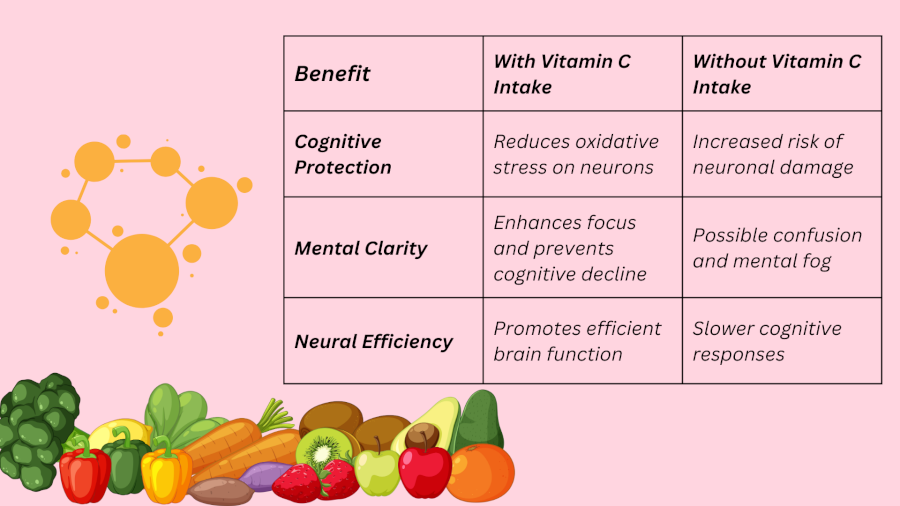Are you feeling drained by mid-afternoon? Does it seem like colds sweep through your office just when you need everyone at their best? You’re not alone.
Many professionals struggle with maintaining energy, managing stress, and staying healthy, especially under tight deadlines and high demands. What if a simple, everyday nutrient could help enhance your focus, bolster your immune system, and keep your energy levels sustained throughout the day?

Enter Vitamin C—a powerhouse vitamin that might just be the unsung hero of workplace productivity. In this article, let’s explore how this essential nutrient can transform your workday, boost overall well-being, and keep you performing at your best.
Enhancing Cognitive Function and Mental Health
Vitamin C, a potent antioxidant, plays an essential role in supporting brain health. By protecting neurons from oxidative stress, it helps maintain optimal cognitive function. Regular intake of Vitamin C can shield the brain from damage, ensuring better performance and mental clarity.
This is particularly crucial in work environments where mental acuity is demanded, as it promotes neural efficiency and prevents cognitive decline.

Reducing Fatigue and Enhancing Focus
Vitamin C deficiency causes tiredness and lack of concentration. Evident investigations have proved that taking enough of this crucial nutrient could greatly boost how well someone can think or be mindful enough to pay attention in class without losing track of what they were trying to learn about during lectures and exams.
By making sure you include Vitamin C into your daily schedule hence highly increasing productivity alongside increased mental alertness over time results into an enhancement when it comes to finding solutions for different complex problems while also carrying out the tasks needed effectively so crucially needed in
Mood Improvement and Stress Reduction
In addition to this vitamin C is important in the synthesis of transmitters such as serotonin and dopamine that control our moods. Additionally, it has been noted that vitamin C reduces the levels of cortisol: human being’s main stress hormone hence helping to minimize stress leading to improved emotional stability.
In such conditions as high-pressure work environments that call for stress management skills, carrying out job responsibilities effectively demands maintaining a constructive mood to promote productivity.
Boosting Immune System Functionality
Speeding Up Recovery from Illness
Evidence suggests that Vitamin C supplementation can speed up recovery times from illnesses. This means employees can return to work quicker, maintaining consistent performance and reducing the impact of sick days on productivity. However, incorporating enough Vitamin C into a daily diet can be challenging due to dietary restrictions, busy schedules, and inconsistent intake. Liposomal Vitamin C supplement can effectively overcome these difficulties by ensuring better absorption and consistent delivery of this vital nutrient, making it easier to maintain adequate levels and support faster recovery.
Decreasing Sick Days and Absenteeism
When we consume enough Vitamin C on a daily basis, it reduces how often we catch colds or get the flu, thereby resulting in reduced occurrences of illness which results in fewer days off work due to sickness.
That does not only help in maintaining a healthier workforce but also makes sure that project timelines and productivity goals remain on track since people do not miss work many times.
Enhancing Physical Health and Energy Levels
Improving Cardiovascular Health
Reducing blood pressure and improving the elasticity of blood vessels are two ways in which vitamin C significantly contributes to cardiovascular health. This results in long term benefits like sustained energy levels as well as lower fatigue experienced by people in general thus maintaining productivity levels all day long.
Combating Inflammation and Pain
Vitamin C has the ability to reduce work-related musculoskeletal pain and discomfort due to its anti-inflammatory actions. This results in decreased pain levels which ultimately make one feel good physically thus enhancing comfort during work duties.
Promoting Better Sleep Quality
Vitamin C and Sleep Regulation
Studies have shown that Vitamin C makes a really big difference in promoting sleep quality. This will increase efficiency at work when compared with daytime alertness enhancements only, while at the same time help tired people lower their dependence on stimulants which are commonly used by adults who are typically worn out.
Energy Restoration and Daytime Alertness
The appropriate amount of Vitamin C taken improves sleeping patterns to increase energy levels after rest with alertness all day. Workers tend to be more attentive, concentrated and efficient while working if they can enjoy proper rest.
Practical Implementation in the Workplace
Dietary Recommendations and Supplementation
If you want to stay healthy, incorporate Vitamin C-rich foods into your daily diet. They include oranges, strawberries, and kiwi among others. However, it is also suggested that taking supplements could work better sometimes- especially if there are times when your body does not get enough through meals alone.
To ensure you get all benefits that come with this important nutrient, adults should follow these guidelines: they must take between 75-90 milligrams every day of their lives.
Creating a Health-Conscious Work Environment
Employee health is significantly affected by workplace wellness programs focusing on nutrition as well as healthy eating habits because they enhance the overall well-being and productivity of employees by encouraging them to eat foods high in vitamin C hence making companies have employees who are more dynamic and vibrant.
Monitoring and Supporting Employee Health
Having regular health assessments and keeping an eye on vitamin C levels are examples of maintaining employee health and well-being. Workers will receive long-term benefits and a safer, stronger consistency workforce from supplementing with enough Vitamin C.
Addressing Common Concerns and Misconceptions
Debunking Myths about Vitamin C Overconsumption
As a company, this is your duty to train your staff concerning the safe limit of Vitamin C. Approximately 2000 mg per day is what adults should have. This encourages them not to worry about taking too much of it while helping them to decide on their own health and wellbeing.
Ensuring Balanced Nutrition
While Vitamin C is a key component of a healthy diet, it is vital to maintain a balanced nutritional intake. This means focusing not only on supplements but also on a diet rich in a variety of nutrients necessary for overall health and well-being.
This detailed guide outlines the critical role of Vitamin C in enhancing workplace productivity through various health benefits, practical implementations, and addressing common concerns. By integrating these strategies, companies can witness significant improvements in workplace dynamics and employee health, leading to a more productive and vibrant work environment.
FAQs
1-How much Vitamin C should I take daily?
Adults should aim for 75-90 mg per day, depending on their health needs and lifestyle, to optimize health and productivity.
2-Can I get enough Vitamin C from food alone?
Yes, a diet rich in fruits and vegetables like oranges, strawberries, and bell peppers can provide adequate Vitamin C. However, in some cases, supplements may be necessary to meet daily requirements.
3-Is it possible to overdose on Vitamin C?
Rare as it may seem to surpass the optimum limit of 2000 mg in a day, side effects like digestive problems could emanate in case it occurs. People should follow the prescribed usage and consider seeing clinicians at times.

Paula Newton is a business writer, editor and management consultant with extensive experience writing and consulting for both start-ups and long established companies. She has ten years management and leadership experience gained at BSkyB in London and Viva Travel Guides in Quito, Ecuador, giving her a depth of insight into innovation in international business. With an MBA from the University of Hull and many years of experience running her own business consultancy, Paula’s background allows her to connect with a diverse range of clients, including cutting edge technology and web-based start-ups but also multinationals in need of assistance. Paula has played a defining role in shaping organizational strategy for a wide range of different organizations, including for-profit, NGOs and charities. Paula has also served on the Board of Directors for the South American Explorers Club in Quito, Ecuador.


























